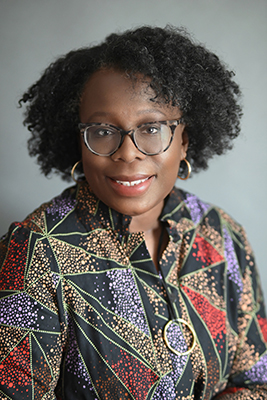Participants define health equity on a hyperlocal level and describe a range of factors that determine health disparities and outcomes
“Health equity” is a term that has become commonly used in both research and medical practice. However, what health equity means to community members on a hyperlocal level is rarely explored. As new research describes, this was the goal of the Detroit Community Health Equity Alliance, an initiative of Wayne State University’s Center for Health Equity and Community Knowledge in Urban Populations, or CHECK-UP.
A report recently published in Health Equity provides unique insight from community stakeholders into what health equity means in Detroit and what drives health inequities. The article, “Use of Rapid Qualitative Analysis to Support Collaborative Synergy Within a Community Coalition for Health Equity in Detroit,” was led by Hayley Thompson, Ph.D., director of CHECK-UP, professor of Oncology at the Wayne State University School of Medicine, associate center director of Community Outreach and Education, and faculty supervisor of the Office of Community Outreach and Engagement at the Barbara Ann Karmanos Cancer Institute.

Participants were D-CHEA members. The group represents a broad, multi-sector coalition collaborating to bring community-level change using initiatives that advance health equity, emphasizing Detroit neighborhoods grappling with persistent poverty. The alliance includes:
- Community development organizations.
- Public health associations.
- Mental health service agencies.
- Population-specific community-based organizations, including those serving and advocating for parents, older adults and LGBTQ individuals.
- Policy groups addressing food access and security and environmental justice.
- Private corporations.
- Community residents from several neighborhoods.
When the group first convened in 2022, members noted the importance of a shared definition of health equity. They also wanted to inform their efforts through community-driven perspectives on Detroit’s most urgent health problems. At a hyperlocal level, what did people think about how structural inequities drive health inequities, and what did they consider a starting point for solutions? This effort was considered important to D-CHEA’s collaborative synergy, theory-driven concept that describes how coalitions gain a collaborative advantage by engaging diverse members and pooling resources.
Dr. Thompson noted that coalitions are critical in efforts to achieve health equity.
“We’ve long understood that for most health inequities, whether they exist in cancer, cardiovascular health, or mental health, there are multiple contributors,” she said. “A coalition allows us to explore and pursue multiple pathways to solutions because it convenes stakeholders with different areas of expertise across public and private sectors who can work on the same problem from different angles. Coalitions support dialogue between people who may not typically work together and create unique opportunities for innovation.”
A novel feature of the study was rapid qualitative analysis or RQA, an increasingly used approach that enables researchers to draw insights from qualitative data more quickly. The method gives researchers relevant answers to questions much quicker than traditional qualitative analysis while maintaining scientific rigor. The study team conducted qualitative interviews based on two frameworks shown to participants during the interview. The first, the Community-Based Solutions to Promote Health Equity Model, describes nine social determinants of health, or SDOHs, and includes a 10th: the digital environment. The second framework, the Social-Ecological Model, helps conceptualize the many influences on the health of individuals, communities and populations.
Participants were asked key questions based on an interview framework informed by the two models. Responses showed:
- An emerging definition of health equity centering equal access to environments that support health and wellbeing and the individual’s intrinsic value and power over their health choices. This includes mental and behavioral health, as well as population-specific problems like Black maternal health, mobility for the elderly, and youth suicidality.
- Recognition of urgent health problems facing the city, from medical conditions like diabetes and cardiovascular disease to lung disease and infant mortality.
- Important input on community priorities for SDOHs, such as income and wealth, employment, public safety, housing, and others, and how lack of adequate access in any of these areas can affect health outcomes.
- A discussion of social-ecological influences on health, including overarching systems like capitalism and racism, and the importance of voting and representation on policy.
The study described numerous health equity strategies moving forward — several of which have been implemented already. This includes home repair programs and efforts to secure vacant or abandoned properties; programs for health and nutrition and food-based entrepreneurship; engagement and advocacy efforts like peer-to-peer outreach and collaboration with faith-based organizations; neighborhood-based innovations, like pop-up service providers and mobile health units; and communication hubs and digital resources. Overall, the study identified dozens of tactics covering everything from housing to digital health.
While the study focused on Detroit, the authors point to broader implications that stakeholders in other large, urban areas may consider as they approach similar community health challenges.
Study co-authors include Ten-Niah Kinney, M.P.H.; Carrie Leach, Ph.D., M.P.A.; Alexandra Sass, WSU Department of Oncology; Ariel Washington, WSU Department of Oncology; Rhonda Dailey, WSU Department of Family Medicine and Public Health Sciences; Elizabeth Towner, WSU Department of Family Medicine and Public Health Sciences; Alyssa Beavers, WSU Department of Nutrition and Food Science; Rodlescia Sneed, WSU Department of Psychology; Karen Solomon Edwards, Detroit Community Health Equity Alliance, WSU Center for Health Equity and Community Knowledge in Urban Populations; Ijeoma Nnodim Opara, WSU Internal Medicine-Pediatrics; Arthur Hampton, Southeast Michigan Health Association; Zachary Cichon, WSU Department of Oncology; Afsana Rinky, WSU Department of Oncology; and Joneigh Khaldun, CVS Health.
Read the study here.